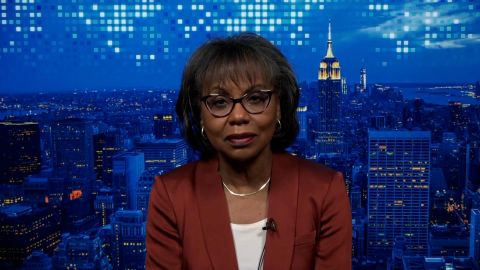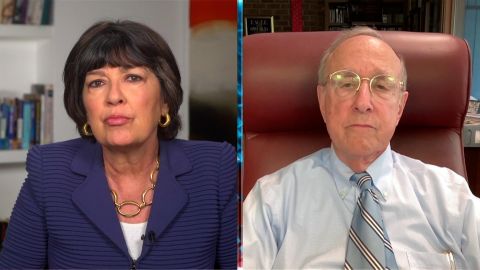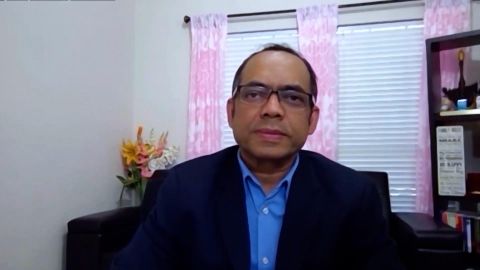Read Transcript EXPAND
CHRISTIANE AMANPOUR: We turn now to an extraordinary story of survival and forgiveness. Ten days after 9/11 race, Rais Bhuiyan was shot at point-blank range by a white supremacist while he was at work. The near-death experience inspired him to set up World Without Hate, which is dedicated to breaking the cycle of violence. And he even campaigned to save his attacker from death row, as he explains to Michel Martin.
(BEGIN VIDEOTAPE)
MICHEL MARTIN: Thanks, Christiane. Rais Bhuiyan, thank you so much for talking with us.
RAIS BHUIYAN, FOUNDER, WORLD WITHOUT HATE: Well, thank you so very much for sharing my story. I truly appreciate that.
MARTIN: We have been talking in recent weeks and months about how the events of 9/11 have had such a long tail in this country and truly around the world. And for you personally, it had a very long tail, and changed the course of your life, actually. And I know it’s not easy to talk about, but, if you wouldn’t mind, I would just like to ask, what happened in the days after 9/11, if you wouldn’t mind sharing that with us?
BHUIYAN: I was working in my friend’s gas station in Dallas, Texas. Before 9/11, I was pretty welcomed by my customers in the gas stations by fellow Americans. But after 9/11, I realized that all those smiley faces, all those friendly faces changed and suddenly they looked at me in such a way that I did something horrible, I committed a crime. And it did not take that long to realize my life in America would never be the same. It was September 21, Friday. Business was pretty slow. And around noon, a man walked in wearing a bandana, sunglasses, a baseball cap, holding a sort of double-barreled shotgun. And then he asked me: “Where are you from?” And before I could say anything to them, excuse me, he pulled the trigger from point-blank range.
MARTIN: What’s the next thing you remember?
BHUIYAN: The next thing I remember, that I was about to die. And when I looked down and saw blood pouring from an open faucet, I thought my time was up. And frantically and instinctively, I placed both hands on my head thinking I keep my brain from spilling out, and I remember screaming mom on top of my voice. And I looked left, saw the gunman still standing there and my military instinct kicked right there and I thought if I did not appear to be dying, he would shoot me again. I fell to the floor on my own pool of blood and he left after a few seconds.
MARTIN: You thankfully survived but at great cost. You were in great pain. Your injuries were quite serious. Do you mind sharing what your recovery was like?
BHUIYAN: Well, as a result of the shooting, I underwent several eye surgeries. Unfortunately, though, I lost vision in one eye. I had better than perfect vision, 20/10, as I was in the air force in Bangladesh. And unfortunately, I lost the vision in one eye. My face and skull was and remains peppered with more than three dozen bullet fragments. I lost my home, my job, my sense of security, and my fiancee, but gained more than $60,000 in medical bills. I reached out to the Red Cross for help and I was told that I was qualified only one week’s worth of groceries.
MARTIN: Why? Because you were not a citizen or what? Why?
BHUIYAN: There was no support structure, NGOs or advocacy groups helping victims like me. The 9/11 Commission, for example, explicitly ensures victims and families of hate crimes after 9/11 do not qualify for support under their definition. I not only physically felt like a wounded soldier in a foreign land, I felt discarded (INAUDIBLE) and less than human.
MARTIN: How did you survive the disappointment, the sense of being discarded and demeaned (ph), not to mention the fact that you were targeted because of your race, your ethnicity, and the fact of a terrorist event that you had nothing to do with? I mean, you came to this country seeking refuge and a better life, and you were almost killed for that. How did you survive that?
BHUIYAN: After the shooting incident, I (INAUDIBLE) myself in the house, I didn’t feel comfortable going outside. And so much trauma, anxiety, and, you know, fear of being shot again, fear of being — you know, getting killed again, it really paralyzed me. And — but then I realized that I need to go out and face my fear head on and do something to get back to normal life. And I remember I forgive my attacker after I got my life back. My faith and upbringing, it inspired me to do that. And I focused on rebuilding my life, slowly getting, you know, into a restaurant working as a waiter and it helped me to overcome my fear of people as I started meeting people in the restaurant. And also started going to school to learn more about computer science. And I remember at the time many Americans, many kind and caring Americans came forward. Like a doctor who treated me. He was a Christian doctor and he did not ask for any upfront payment. He began to treat me. And then, a Muslim man from the local mosque gave me a scholarship. An air force veteran gave me his extra car. So, yes, one American tried to kill me, but after that, many kind and loving, caring Americans came forward to help rebuild my life.
MARTIN: Let’s talk about that for a minute, Rais. The man who shot you, Mark Stroman, also killed two other people in the same time span in which he attacked you. It made it clear that this was revenge for 9/11. He didn’t know you, he didn’t know any of the other people that he attacked as well. So, how did you process all that? Like how did you process that he tried to kill you not because of anything you had done, but because of who you are, what you are. How did you think that through?
BHUIYAN: Well, before 9/11, I was totally unknown to my attacker. But immediately after, I was labeled as a threat, a terrorist, an extremist living in society because of my race and personally (ph) Islamic faith. And after Mark was arrested, he exactly said that repeatedly watching the same footage of the Twin Towers being hit by planes, listening to the leaders and news commentators, I snapped. I took up arms to kill some Muslims who did this heinous crime to our country. And after his arrest, he also said that what he did most Americans wanted to do the same, they just didn’t have the guts. And he claimed he was a true American, a patriot. So, when I considered everything, what was the environment looks like after 9/11, I realized that he was a victim of islamophobia. And he never met a Muslim, had no knowledge about Islam, but since he was fixated with the news seeing the same footage again and again, he snapped. So, purely, hate motivated him, his destructive anger, his ignorance and fear of Muslim led him to do this heinous crime. So, now, by executing him, the islamophobia, the anti-Muslimism sentiment and the fear and all the intolerance in our society would not go away. And all the pain and suffering I and the other victims and their loved ones that went through would not be erased. But we have the capacity to turn this negative insidious (ph) into something positive.
MARTIN: You famously began a campaign to spare the life of your attacker. How did that start?
BHUIYAN: Well, I learned about the power, beauty and benefit of forgiveness at a very young age. It was from my parents and from my Islamic faith. And forgiving my attacker, it was a multiple-step process. Because when we are hurt, we are not likely to respond with mercy and understanding. Our initial instinct is to recoil, you know, and self- protect. So, once I got my life back, I thought about, you know, what my parents taught me, what my Islamic faith taught me, and I realized that by executing him, we would simply lose a human life without dealing with the root cause. I began to see him as a human being like me, not just as a killer. I saw him as a victim too. I suffered terribly but I did not see any value in him suffering as well. And I remembered what it feels like to be on the brink of death, begging to God for a second chance. I learn about the verse in the holy Koran, chapter 5 and verse 32, where it says that, saving a life is like saving entire mankind, and taking a life is like taking a life of entire mankind. And I was extremely convinced that I needed to go the extra mile to save the life of the man who tried to end mine.
MARTIN: Did your attacker — Mark Stroman, did he know that you were fighting for his life?
BHUIYAN: When we launched our global campaign to save the life of my attacker, he actually heard from his lawyer that one of his victims was running a campaign to save his life. He told his lawyer that, I do not believe. I never said, sorry, I never apologized and I destroyed their lives, especially his life. And now, he forgave me and is running a campaign to save my life. He was reduced to tears. And he said, I do not deserve that. I’m someone unforgivable. And he wrote a letter to me from the death row and in one paragraph, this is what he said, that, my stepfather taught me some lessons that I should have never learned. It has taken me far too long to unlearn some of them and I’m still working on some of them. I don’t know who your parents were, but it is obvious they are wonderful people to lead you to act this way to someone you have every right to hate. He thanked the entire Muslim community, condemned his own acts of violence and he called me brother. And I never imagined that, you know, this person would call one day brother and would say he loved me. So, when he learned about our campaign, he went through a tremendous transformation and he talked about world peace, mercy, justice, peace, hate crimes and how he was wrong, what went wrong in his life and how he ended up killing people and finding himself in the worst possible place on earth, death row.
MARTIN: I think this story is well-known enough now that I can share that you did not succeed in your quest to spare his life.
BHUIYAN: Well, while it’s true that we did not succeed, but in the end, you know, love won. Humanity won. And he was at peace before he was executed. He found Jesus Christ, he’s death (ph) on him, in his heart and the humanity, and he urged me to continue my human rights work to help people like him and those who are struggling with pain, with anger, with trauma.
MARTIN: You know, as we are speaking now, the new information — the FBI reports annually on hate crimes. You are understood as a victim of a hate crime. You were attacked not because of anything personally that you did or any interpersonal interaction, but because of your — because of what you are. And ss we are speaking now the FBI has reported that hate crimes in the United States are at their highest level in more than 10 years. Why do you think that is?
BHUIYAN: Hate crime, you know, rose after 9/11. It died a little bit, it decreased a little bit, it came back in 2008 and 2012 during the presidential campaign of President Obama. It came back again in 2016 and 2020 because hate became normalized, legalized. And, you know, misinformation, lies, intolerance, you know, everything became a part of our daily life and we are living in an environment where we have become desensitized, and that is why, you know, there’s a lack of empathy in our society as well. We don’t want to take time to learn about the others, those who are unlike us. We are afraid of the other instead of taking time to get to know them. So, there’s a huge disconnect in our society, lack of empathy, lack of understanding. And at the same time, some of our public officers, leaders and the ruling class, they are advancing — you know, they are gaining politically and personally by spreading misinformation, lies and intolerance and fear.
MARTIN: So, I’d like to ask you what steps you would like to see people take, especially those who have not undergone an experience as remarkable as yours. What would be your argument to them for why they should reach out in the way that you have?
BHUIYAN: Well, the first thing we all should do is to keep room for a dialogue, to keep the door, window, whatever we can keep for more dialogues, more discussion. And I would love to give you a quick example that more recently, I was invited to meet with the commander of an armed anti-Islamic group for a one-hour conversation that lasted about five. And during that five-hour conversation, sometime — actually, to be honest with you, it boiled my blood. I was extremely disrespected. I was demonized. You know, I was insulted. But I wanted to continue the conversation because I wanted to hear from him why he hates Muslims so much and why he formed this armed hate group against Muslims and Islam. And it helped. He opened up. And as I said that I share a lot of facts, a lot of information about Muslims and Islam, and this conversation helped him to learn something different that he never believed, he never learned. So, that’s why I tell people to please find ways to connect with others, especially people unlike you, and try to take time to learn from one another because that’s what happened in my case as well. When my attacker did not know me, he hated me. But when he learned about me and he educated himself about Muslims and Islam, he called me brother and he say he loved me.
MARTIN: Rais Bhuiyan, thank you so much for talking with us and sharing your story with us.
BHUIYAN: It is my great pleasure and thank you so very much for sharing my story.
About This Episode EXPAND
Anita Hill discusses her new book “Believing: Our Thirty Year Journey to End Gender.” Military historian Richard Kohn weighs in on General Milley’s testimony before the Senate. World Without Hate founder Rais Bhuiyan explains why he has dedicated his life to breaking the cycle of violence. The late artist Christo’s nephew Vladimir Yavachev reflects on his uncle’s legacy.
LEARN MORE


